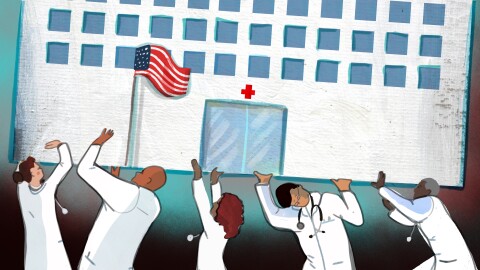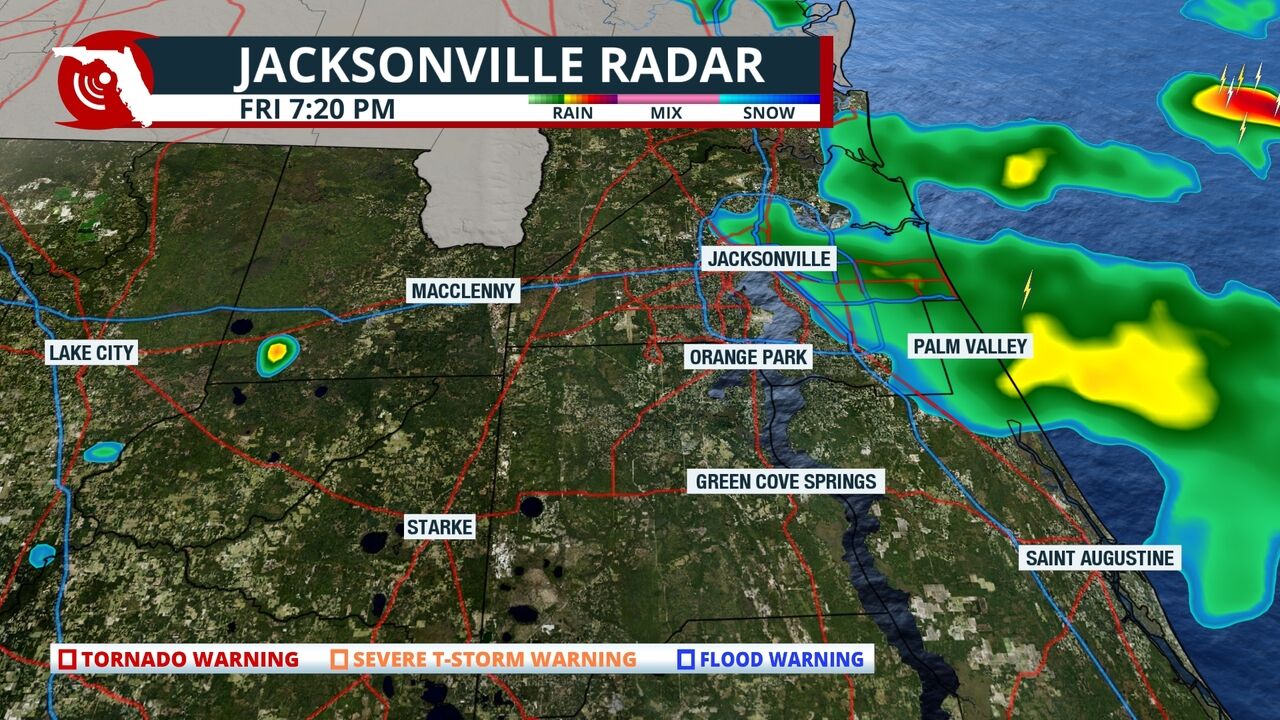Latest Local Newscast from WJCT News 89.9
Latest National Newscast from NPR News
NPR News: 07-29-2024 3PM EDT
NPR News: 07-29-2024 3PM EDTLearn more about sponsor message choices: podcastchoices.com/adchoicesNPR Privacy Policy
Dive into the heart of Northeast Florida with First Coast Connect . This captivating weekday call-in program brings you face-to-face with the region's movers and shakers, from community leaders and local artists to standout event planners. Engage in vibrant discussions and delve into the week's hottest topics with our exciting Friday Roundtable, featuring a dynamic mix of local media personalities and civic luminaries. Tune in, connect and become part of the community conversation.
Weekdays live at 9 a.m.; Rebroadcast at 8 p.m.
Weekdays live at 9 a.m.; Rebroadcast at 8 p.m.
- Call us: 1 (904) 549-2937
(Note: This line is only active during the program, 9 -10 a.m.) - Email: firstcoastconnect@wjct.org
- Twitter: Tag @FCConair on Twitter
- Facebook: Comment on facebook.com/FCConair
The head of Cecil Spaceport discusses development, challenges and exactly when the East Coast’s first commercial horizontal launch spaceport might actually blast off.
What's Health Got to Do with It? is an engaging weekly talk show hosted by Dr. Joe Sirven, a renowned physician and medical journalist. The show navigates the intricacies of the healthcare system, offering insight into treatment access, insurance coverage, and maintaining good health. Each episode, centered around a specific topic, dives into compelling healthcare stories and explores solutions for healthcare challenges. The program encourages active listener participation, fostering a community that is locally-focused and solution-driven on healthcare issues.
Saturdays at 4 p.m. and Sundays at 9 p.m.
Saturdays at 4 p.m. and Sundays at 9 p.m.
What's Health Got to Do with It?
The hidden realities of living with inflammatory bowel disease, from navigating doubt and misdiagnoses to overcoming daily symptoms and setbacks. Then, how a personal misdiagnosis led an emergency room physician to help others advocate for themselves.
Hear what Florida is talking about each week with newsmakers and journalists discussing issues defining the Sunshine State, hosted by Tom Hudson.
This show is co-produced by WLRN in Miami and WUSF in Tampa.
Ways To Connect
This show is co-produced by WLRN in Miami and WUSF in Tampa.
Ways To Connect
- Call us: 1 (305) 995-1800
- Twitter: Tag @FloridaRoundup
This week on The Florida Roundup, best-selling author and Florida resident Brad Meltzer joins us to talk about free expression in the Sunshine State, what the escalating cost of living means for families hoping for a new start in Florida, and finding empathy in an increasingly polarized and politicized world (00:00). Plus, a review of the first week of the 2026 Florida Legislative Session with Douglas Soule, “Your Florida” state government reporter (08:50). And we also fact-checked the 2026 State of the State address with PolitiFact’s Samantha Putterman (12:40).
Immerse yourself in the rhythm of Jacksonville with the Jacksonville Music Experience (JME). Brought to you by WJCT Public Media, JME is your passport to an eclectic musical journey. From unique radio stations to curated playlists, live events, and insider insights - discover, explore and fall in love with Jacksonville's dynamic music scene through JME.
Reporters from public radio stations across the state bring you timely news and information from around Florida. Whether it's legislative maneuvers, the economy, environmental issues, tourism, business, or the arts, Capital Report provides information on issues that affect the lives of everyday Floridians.You can also subscribe to Capital Report as a podcast on Apple, Spotify, and Google.
-
On tonight's program: As this year’s Florida lawmaking session begins, Governor DeSantis has just one ask of lawmakers; Despite some tiffs and occasional hard feelings, most Florida lawmakers seem determined to smooth out the lingering rough spots with their colleagues this year; Florida may not be Cuba, but the two lands are now and forever linked as Cubans in Florida struggle to reclaim their homeland; Changes in Florida law as well as federal immigration policy has placed a growing number of immigrant laborers in mortal danger; And your airport chauffeur could soon be a pilot instead of a driver.
-
On tonight's program: Governor DeSantis faces his final legislative session as governor starting next week. And there could be some serious headwinds for the governor and his agenda; A once greatly-respected advocate against domestic violence pleads no contest to multiple felony charges; Governor DeSantis has some thoughts about state regulation of AI; While AI platforms like ChapGPT can have many positive aspects, there are also dangers; And environmental advocates say there are solid reasons why there are regulations regarding fragile places like Florida’s Everglades.
-
On tonight’s program: Florida lawmakers hadn’t originally planned for 2026 to be a congressional redistricting year. But then President Donald Trump called; A priority of Florida’s senate president to funnel more state resources into rural counties didn’t make it in 2025.But it’s make a return appearance in 2026; A move to allow younger Floridians to own long guns is attracting some pushback ahead of the lawmaking session; Florida law requires rental property owners to take reasonable steps to protect their tenants from things like gun violence. Although that law was watered down a few years back; If you’re whipsawed by inflation at the grocery store, you might want to consider growing more of that food yourself; And we go back in time a quarter-of-a-century to a political meltdown that was very unlike today when all politics is taken very personally by everybody.
-
On tonight’s program: We remember the tragic shooting on FSU’s campus and the resilience of the university’s students; As Florida starts dumping public health mandates in favor of personal choice, it seems viruses don’t really respond all that well to political arguments; Florida brings back its controversial black bear hunt, although state officials insist everything will be done “humanely” and “by the book.”; During the year nearly passed, it seemed a growing number of people joined the campaign to persuade more bio-dads to become actual loving, supportive and present fathers; And this year has been one of citizens making their voices heard. We visit one of the No Kings Protests that took place on the Florida Capitol lawn.
-
On tonight's program: In Florida, the battle lines are being drawn In the upcoming fight over who will pay for all the infrastructure the AI industry needs; We get a look ahead to how Florida property taxes may change, now that Governor DeSantis has weighed in on the matter; The present wave of anti-Semitic violence has Jewish congregations on high alert; An investigative report by the Miami Herald and Tampa Bay Times suggests theDeSantis administration diverted more than $35 million in taxpayer money to fight two ballot initiatives. Money that should have gone somewhere else; It’s the old city vs country debate, but with untold millions of dollars-worth of development hanging in the balance, politics is playing an even bigger role; Florida’s official public health policy is moving away from required vaccinations. But that hasn’t stopped many in the medical community from citing worrisome data; Florida signs on to a multi-state lawsuit against the popular weed killer Roundup; and the old saying about “music having charms to soothe the savage beast” is being amended to say: “music has charms to soothe the saddened soul.”
-
On tonight’s program: What’s the connection between free speech and violence? There’s some new research on that subject and the results are a bit disturbing; Is Florida’s electorate swinging back in a Democratic direction? The state’s Republican Party leader thinks not; Certified Public Accountants may seem an unassuming lot. But it seems they have some critical superpowers; And it’s been said you can recycle just about anything nowadays. And it seems that includes already used water in Central Florida.
Florida Frontiers: The Weekly Radio Magazine of the Florida Historical Society is a combination of interview segments and produced features covering history-based events, exhibitions, activities, places and people in Florida. Join host Ben Brotemarkle as he explores the relevance of Florida history to contemporary society, and promotes awareness of heritage and culture tourism options in the state.
-
SEGMENTS | Bob Carr - 'The Python Conspiracy' | 16th Century Florida in The European Imagination | Adventure Tourism and The Florida Frontier
-
SEGMENTS | Greek Orthodox Epiphany in Tarpon Springs | Florida in The French Revolution | Bob Kealing on Jack Kerouac in Florida
-
SEGMENTS | The Historic Town of Cassadaga | The Legacy of Ponce De Leon | History of The Orange County Courthouses
-
SEGMENTS | Christmas Community Pioneers | Christmas From Florida's Past | Silent Christmas in Cuba
-
SEGMENTS | Henry Flagler's Whitehall Estate | Harvest V. Board of Public Instruction | Orlando International Airport - MCO
-
SEGMENTS | Orlando Collected Exhibit | Ft. Myers in The Civil War | Abandoned Vehicles of The Everglades
Discover Jacksonville like never before with Jacksonville Today, a nonprofit local digital journalism service from WJCT Public Media. With a daily five-minute read, stay updated on the city's top news, events, and engaging opinion pieces. Beyond news, it's your doorway to actively participate in the community. Get ready to experience Jacksonville, one email at a time.
NPR News is your go-to destination for reliable national news, delivering comprehensive reporting, thoughtful analysis, and engaging storytelling. With a commitment to accuracy and balanced coverage, NPR News keeps you informed about the latest national happenings, offering insights and perspectives that go beyond surface-level news.
-
Far-Flung Postcards is a weekly series in which NPR's international team shares moments from their lives and work around the world.
-
President Trump is expected to address affordability at the World Economic Forum today. And, Minnesota officials react after the Justice Department subpoenas them.
-
Secretary of State Antony Blinken and his British counterpart, David Lammy, are raising alarms about Iranian ballistic missiles in Russia that threaten Ukraine.
-
The state partnered with a nonprofit to wipe out the debts. It also has a plan in place to prevent medical debt for people in specific income brackets.
-
Nearly 280 filmmakers entered the Internet Archive's annual contest celebrating creative freedom without copyright restrictions.
-
At issue are President Trump's efforts to break with 112 years of law and precedent by firing Lisa Cook, a member of the Federal Reserve's governing board.
Every weekday for over three decades, NPR's Morning Edition has taken listeners around the country and the world with two hours of multi-faceted stories and commentaries that inform challenge and occasionally amuse. Morning Edition is the most listened-to news radio program in the country.
Weekdays 5:00 a.m. to 9 a.m.
Weekdays 5:00 a.m. to 9 a.m.
-
NPR's Leila Fadel asks veteran diplomat Richard Haass about President Trump's objectives with his address to the World Economic Forum in Switzerland.
-
South Carolina is fighting a new, fast-growing outbreak of the measles, as concern grows that the U.S. is poised to lose its measles elimination status.
-
The U.S. president is in Davos, Switzerland for the World Economic Forum's annual meeting. Trump's push to acquire Greenland has turned to antagonism toward allies in recent days.
-
Trump to address World Economic Forum, DOJ subpoenas Minnesota officials in obstruction probe, SCOTUS to hear case that could give presidents unprecedented control over the Fed.
-
Mezzo-soprano Denyce Graves is retiring from the stage after a last performance as Maria in the Gershwins' Porgy and Bess at the Metropolitan Opera, and looking ahead to directing and mentoring.
-
The tensions between the U.S. and Western Allies are a source of satisfaction to many in the Kremlin.
In-depth reporting has transformed the way listeners understand current events and view the world. Every weekday, hear two hours of breaking news mixed with compelling analysis, insightful commentaries, interviews, and special - sometimes quirky - features.
Weekdays 4:00 p.m. to 6 p.m.
Weekdays 4:00 p.m. to 6 p.m.
-
We talk with a NOAA scientist about the Northern Lights, and why their visibility seems to be increasing.
-
In the wake of the Bondi Beach terrorist attack last month, Australia toughened its gun laws on Tuesday.
-
Security at the biggest ISIS detention camp in Syria has collapsed as Syrian Kurds withdraw to face advancing government forces.
-
In West Africa, tiny Benin is riding a coastal building boom — but beneath the cranes and construction, new inequalities are taking hold.
-
President Trump held court with reporters for more than 90 minutes marking the first year anniversary of his second term.
-
Many Americans agree with President Trump that Europe should pay more for its own defense, but think his attacks on U.S. allies are unwise and will hurt the United States in the end.
Marketplace, hosted by the charismatic Kai Ryssdal and produced by American Public Media (APM), is an influential and informative radio program that delivers a fresh perspective on the economy, business, and finance.
-
After decades of globalization, the U.S. may be paying a political price: International leaders are forging new trade agreements independent of American influence. In this episode, as some countries no longer see the U.S. as a reliable trade partner, will the global economy leave America behind? Plus: Sellers outnumber buyers in parts of the housing market, Georgetown’s Dorothy Brown discusses her new book about reparations, and we preview Fed governor Lisa Cook’s upcoming Supreme Court hearing.Every story has an economic angle. Want some in your inbox? Subscribe to our daily or weekly newsletter.Marketplace is more than a radio show. Check out our original reporting and financial literacy content at marketplace.org — and consider making an investment in our future.
-
President Trump has announced new tariffs on European Union countries, aimed at forcing a deal for the U.S. to acquire Greenland. But the EU could respond relatively quickly, with sanctions of their own. In this episode, the EU’s “bazooka” option. Plus: Trump’s recent housing proposals won’t fix the fundemental issue driving housing affordability, technology has changed how parents dole out kids’ allowance, and we explain the history of economic jargon.Every story has an economic angle. Want some in your inbox? Subscribe to our daily or weekly newsletter.Marketplace is more than a radio show. Check out our original reporting and financial literacy content at marketplace.org — and consider making an investment in our future.
-
An AI-driven construction boom is coming, some hope. But to build all that infrastructure, the U.S. is going to need a lot more construction workers, plumbers, HVAC technicians, and other skilled workers. And President Trump’s immigration policies actively work against that goal. Also in this episode: Trump withdraws the U.S. from a key global climate change agreement, Americans shell out for at-home coffee setups, and Kai discusses the week’s economic headlines with Greg Ip at the Wall Street Journal and Amara Omeokwe at Bloomberg.Every story has an economic angle. Want some in your inbox? Subscribe to our daily or weekly newsletter.Marketplace is more than a radio show. Check out our original reporting and financial literacy content at marketplace.org — and consider making an investment in our future.
-
President Trump recently ordered government-backed mortgage companies (that’s Fannie Mae and Freddie Mac) to buy up $200 billion in mortgage-backed securities. The last time they bought these bonds was the 2008 financial crisis. Will the move actually lower rates? Probably not much. Also in this episode: Venture capital can thank AI for a 2025 rebound, banks fight to block stablecoin interest yields, and more young people are getting prenups.Every story has an economic angle. Want some in your inbox? Subscribe to our daily or weekly newsletter.Marketplace is more than a radio show. Check out our original reporting and financial literacy content at marketplace.org — and consider making an investment in our future.
-
The unemployment rate in December among people aged 20 to 24 was 8.2%. That’s up nearly a full percentage point from 2024, and much higher than the overall unemployment rate of 4.4%. The job market is tough, and getting tougher, but why is it particularly hard for Gen Z? Also in this episode: Trump’s focus on Venezuelan crude could redirect Canadian oil, companies use surveillance data for “personalized” pricing, and China’s trade surplus grew by 20% last year, in spite of U.S. tariffs.Every story has an economic angle. Want some in your inbox? Subscribe to our daily or weekly newsletter.Marketplace is more than a radio show. Check out our original reporting and financial literacy content at marketplace.org — and consider making an investment in our future.







































